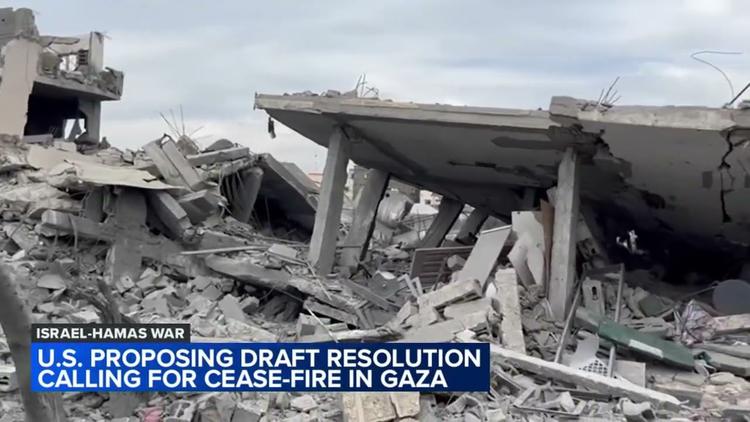February 20, 2024
Ann Arbor (Informed Comment) –
Julian Borger at The Guardian says he has seen a draft US proposal for a United
Nations Security Council calling for a “temporary ceasefire” in Gaza and
cautioning against any offensive on the southern Gaza region of Rafah, where
1.4 million refugees from the rest of Gaza have joined the existing hundreds of
thousands of residents.
The Security Council What’s in Blue
site says that the US text calls for a “temporary ceasefire in Gaza as soon as
practicable, based on the formula of all hostages being released.”
According to Borger the draft goes
on to state that the Security Council “determines that under current
circumstances a major ground offensive into Rafah would result in further harm
to civilians and their further displacement including potentially into neighboring
countries, which would have serious implications for regional peace and
security, and therefore underscores that such a major ground offensive should
not proceed under current circumstances”.
What’s in Blue says that Algeria’s
resolution in favor of an immediate ceasefire, to be debated Tuesday morning,
will be vetoed by the United States. Algeria developed its resolution on the
basis of the January 26 ruling by the International Court of Justice issuing a
preliminary injunction against Israel on the grounds that it is plausibly
committing genocide against the Palestinians of Gaza.
The US insists that any resolution
condemn the October 7 terrorist attack by Hamas on Israel, which other Security
Council members have been unwilling to include, since they do not wish to
couple it with the issue of Israel’s disproportionate response in Gaza.
Algeria’s text lacks such a reference, though it does call for the release of
the dozens of Israeli hostages held by Hamas.
It appears that after it vetoes the
Algerian resolution, the US will table its own call, which is more favorable to
the Israeli war effort. It asks not for an immediate permanent ceasefire but
only a temporary cessation of hostilities as soon as Israel finds it
“practicable.”
It is, however, widely believed that
any “temporary” ceasefire would likely be the de facto end of this Gaza
campaign. Israel will find it difficult to start the war back up thereafter,
especially in the March-April Ramadan fasting period when there are special
sensibilities among Muslims worldwide.
The US had declined to call for a
ceasefire, even a temporary one, for the past couple of months since the last
pause ended. The Biden administration cautioned against Prime Minister Binyamin
Netanyahu’s plan for an invasion of Rafah, but did not seem inclined to do more
than frown about it.
So the new resolution, however
hedged about and favorable to Israel it may be, is nevertheless a huge
about-face for Mr. Biden. It puts him on a collision course with Mr. Netanyahu,
who says he insists on the invasion of Rafah.
Why is Biden at long last taking
even a feeble practical stand at the UN?
Let me broach some informed guesses
in response to this question.
First, Biden is getting enormous
pressure from Egypt and other Muslim states to forestall a Rafah campaign that
would force the Palestinians of Gaza into the Sinai Peninsula. The Wall Street
Journal and other right wing US newspapers may think that there is nothing you
couldn’t bribe the Egyptians into accepting. Receiving 2.2 million Palestinian
refugees into a Sinai Peninsula which is already a severe security problem,
however, is not acceptable to Abdelfattah al-Sisi and the rest of the officer
corps. No amount of foreign aid or debt forgiveness could cover the enormous
costs such a development would incur for Egypt. The US draft resolution refers
obliquely to the Egypt dilemma, which suggests that Biden is trying to mollify
Cairo. And it isn’t only Egypt. Biden’s team, including Antony Blinken, are
auditioning for the role of Jared Kushner 2.0 by trying to add Saudi Arabia to
the Abraham Accords. My suspicion is that Mohamed Bin Salman has told Blinken
hell will freeze over first, if Israel goes through with a Rafah massacre. The
Saudis may hate Hamas, but they hate unrest among their own citizens more, and
the Saudi populace is boiling with anger.
Second, Biden is probably tired of
having all his campaign rallies disrupted by people shouting “How many kids did
you kill today?” Biden’s win in 2020 depended heavily on the youth and African
American vote, and both groups are deeply unsettled by Biden’s complaisance
toward Netanyahu’s butchery. The president cannot afford to lose Black voters,
many of whom identify with the Palestinians. This war is disastrous for Biden’s
reelection campaign and it is incredible that his team cannot see that.
Third, and this is just speculation
on my part, the Ukrainians are losing the war with Russia because they don’t
have enough artillery shells. President Volodymyr Zelensky more or less
admitted it at last weekend’s Munich Security Conference. It could well be that
the Israelis are proving such artillery shell hogs that the Pentagon is
beginning to have to stiff Zelensky to keep the Israelis supplied. A Rafah
campaign would put enormous pressure on the ammunition supply train, which is
already stretched to the breaking point, from all accounts.
Fourth, Biden has asked Netanyahu to
protect civilian noncombatants in Gaza, and has been rebuffed by Tel Aviv.
Netanyahu and his ultra-Right Kahanaist government say they will do as they
please regardless of Biden’s wishes. Leaking this draft resolution to the
newspapers and then pushing it at the Security Council is a way for Biden to
pressure Netanyahu and his cabinet to wind down the war without a further
massive bloodbath in Rafah. Exerting pressure through the UN gets Biden off the
hot seat with pro-Israel voters, since if the resolution passes it will be
multi-lateral. It is therefore preferable in an election year to standing up to
Netanyahu by, for example, cutting off ammunition, which Biden could do.


No comments:
Post a Comment